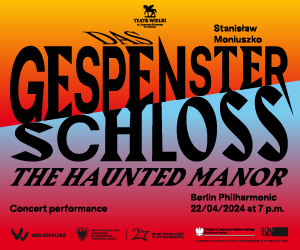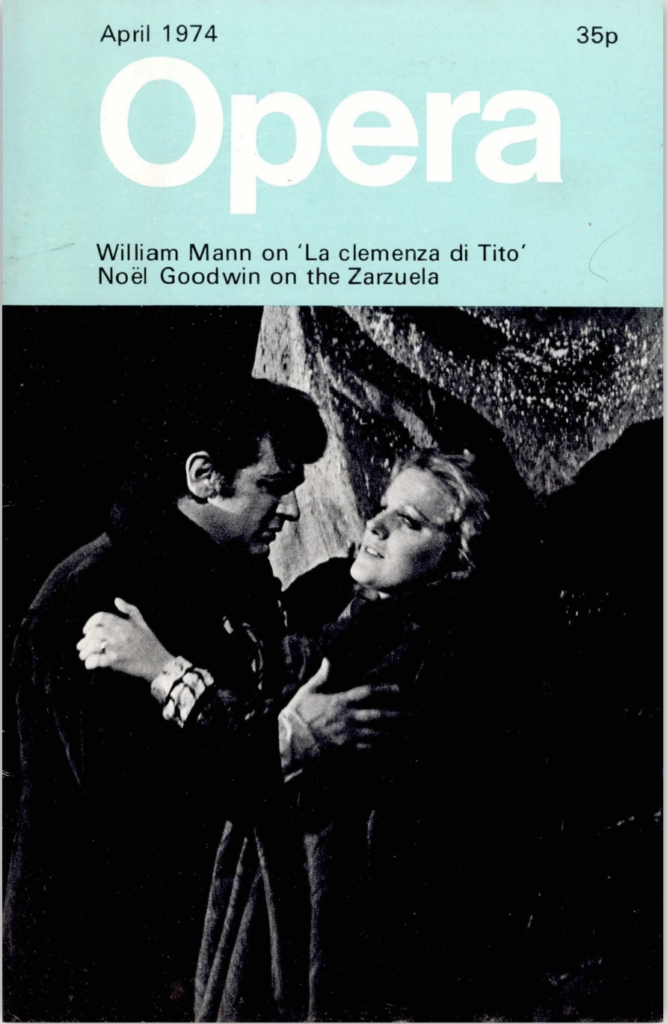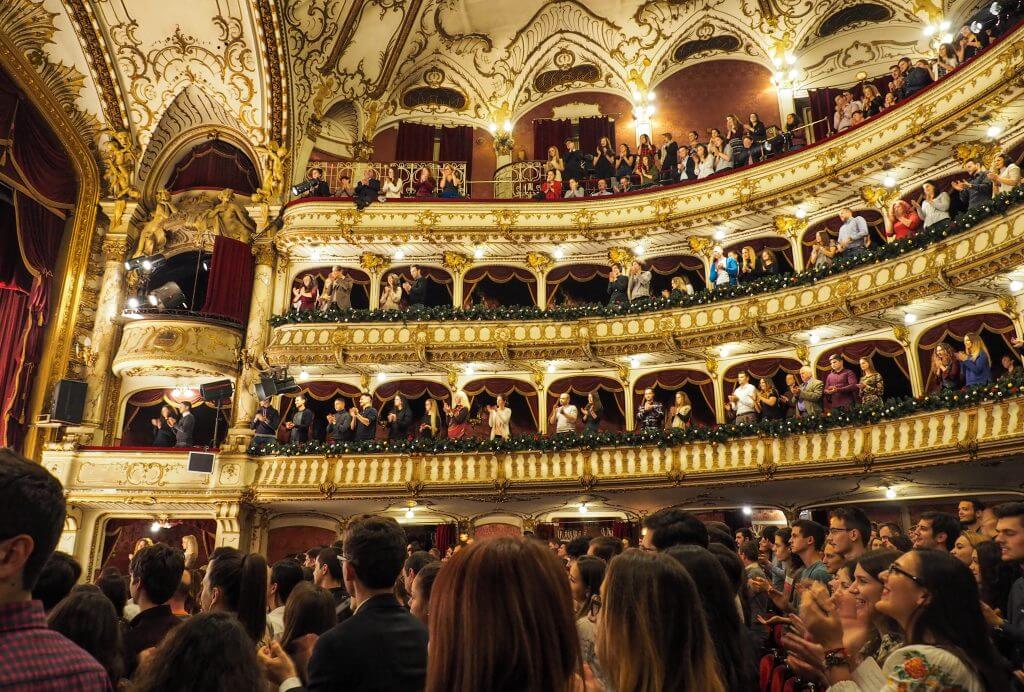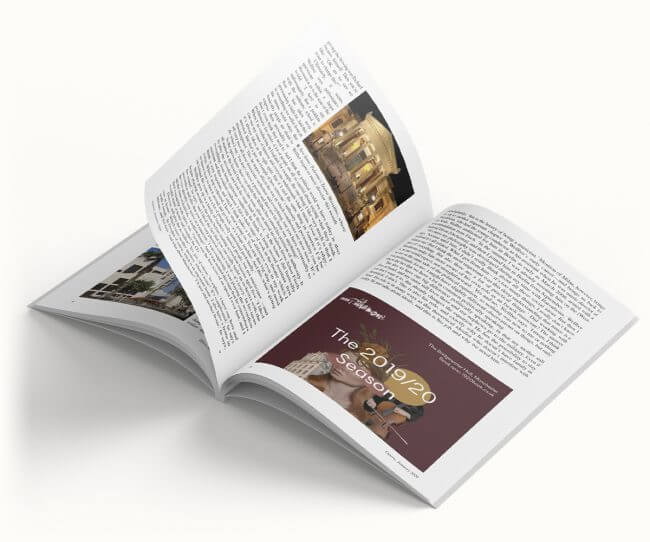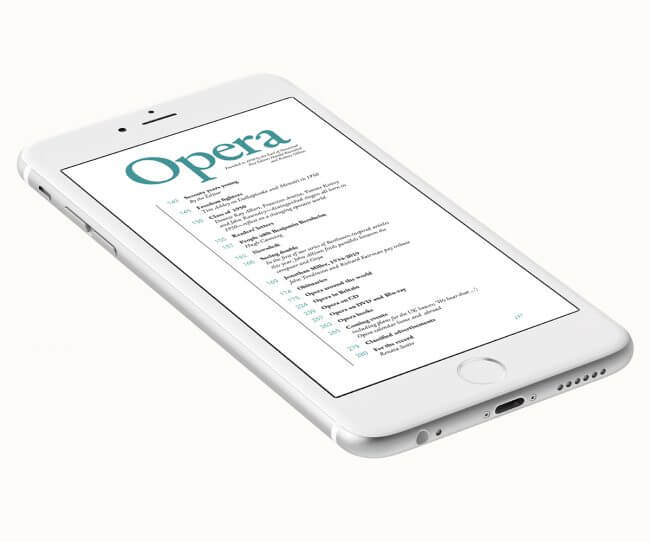Juan Diego Flórez
April 2009 in People
The Rossini revival has been running now for several decades, with no sign of letting up, and during its course a number of singers have specialized in the extraordinarily difficult tenor roles that once looked utterly impossible on paper. Among them one could mention Ernesto Palacio, Chris Merritt, Rockwell Blake, Bruce Ford and, in recent years, Lawrence Brownlee and Colin Lee. But none currently shines more brightly than the Peruvian Juan Diego Flórez, who seems to have been born to conquer such roles and, additionally, has learnt to sing them with surpassing grace, delicacy and imagination. Plácido Domingo has gone on record as saying that he believes that no one in history has ever sung these roles as well as Flórez—and though that’s an unprovable assertion, I’m not about to argue with him. It’s certainly hard to imagine anyone doing them better.
I met up with the 36-year-old tenor during what was, significantly, Covent Garden’s first run of Rossini’s Matilde di Shabran since 1854. His performance of the strenuous role of the antisocial Corradino, finally tamed by the love of a good woman, was physically an assault course and was vocally carried off with seemingly easy aplomb. Flórez even looked as if he enjoyed it. ‘Very much! It’s like exercise, like going to the gym—my legs after the show are trembling, running up and down and up and down, falling on the floor. The others don’t really run so much. That’s my fault. I started to do all these movements and the director said, “Yes, keep that!”’
 Flórez is apparently up to any challenge whatsoever—provided it fits a voice that he understands extremely well. Music, if not opera, was with him from the first. His father was a popular singer of Peruvian music and sang at home with the guitar. ‘When I was 11, I would grab the guitar and start playing chords and composing songs. I was into pop, rock and Peruvian songs. I wanted to be a musician and I went to many academies of music. When I entered the conservatory in 1990, to study voice and piano, I was concentrating on pop. Then I started to change my mind—I discovered my voice, I discovered the great composers, I sang in the national choir and I studied with my teacher, Andrés Santa María, for three years.’ After that he decided he ‘wanted to go and meet the world’ and began to research American conservatories for auditions. ‘I went to New York. It was my first time outside Peru, and also the first time when I understood that I had some talent, because everyone wanted me—the Juilliard, the Manhattan School, the Curtis Institute—so I thought, “I must be good, then!”’
Flórez is apparently up to any challenge whatsoever—provided it fits a voice that he understands extremely well. Music, if not opera, was with him from the first. His father was a popular singer of Peruvian music and sang at home with the guitar. ‘When I was 11, I would grab the guitar and start playing chords and composing songs. I was into pop, rock and Peruvian songs. I wanted to be a musician and I went to many academies of music. When I entered the conservatory in 1990, to study voice and piano, I was concentrating on pop. Then I started to change my mind—I discovered my voice, I discovered the great composers, I sang in the national choir and I studied with my teacher, Andrés Santa María, for three years.’ After that he decided he ‘wanted to go and meet the world’ and began to research American conservatories for auditions. ‘I went to New York. It was my first time outside Peru, and also the first time when I understood that I had some talent, because everyone wanted me—the Juilliard, the Manhattan School, the Curtis Institute—so I thought, “I must be good, then!”’
At Curtis he auditioned for the voice programme, which didn’t include staged opera, ‘just a few arias, and a lot of songs. But they didn’t have a tenor, so they put me to sing all the operas. I had only sung maybe a couple of arias before. I arrived in September and in November I was already singing Capuleti e i Montecchi. I was thrown into the bullfight!’—a pattern that would repeat itself throughout Flórez’s early career.
How was it for him starting on the stage? ‘I wasn’t comfortable—not for a few years. It’s very difficult for an opera singer. You have to have a good technique, which allows you to be confident as an actor. That’s difficult to achieve. When you act, you forget singing sometimes, and when you are thinking too much about singing you don’t act well. That’s a learning process that you maybe never finish. The goal is to become a great actor-singer, and I think I’m getting better and better in that direction, but at the beginning I was so stiff! When I did Capuleti my arms were numb—but little by little you loosen up. I think Matilde is good because I’m completely into my movements. But if you are a self-critical person you never stop learning. That’s the beauty of our career.’
He views Corradino in Matilde as ‘quite a complex individual, rather messed up inside. He hates women, he loves war, he hates poets, he hates gay people, he is a hypochondriac—this is a person with problems. As in my other roles, I like to make him even funnier. In the past in Barbiere the tenor sang nice tunes but he was not funny enough, because he is actually the funny guy in the opera. Figaro is the sympathetic guy, Bartolo is the mean guy. The funny one is the Count, who hasn’t been played like that so much in the past.’
 He’s made a point in Barber productions of singing the often-cut final rondo, ‘Cessa di più resistere’. ‘I always like to sing it, of course, but it shouldn’t really be a choice because it’s in the score, not the appendix. A mezzo wouldn’t come and say, “I don’t like to sing ‘Una voce poco fa’.” It should be the same with “Cessa di più resistere”. At La Scala they didn’t let me do it. I wanted to, but they wouldn’t let me. Then the next time I came to sing Barbiere there they begged me to do it. So I said, “I will think about it.”’
He’s made a point in Barber productions of singing the often-cut final rondo, ‘Cessa di più resistere’. ‘I always like to sing it, of course, but it shouldn’t really be a choice because it’s in the score, not the appendix. A mezzo wouldn’t come and say, “I don’t like to sing ‘Una voce poco fa’.” It should be the same with “Cessa di più resistere”. At La Scala they didn’t let me do it. I wanted to, but they wouldn’t let me. Then the next time I came to sing Barbiere there they begged me to do it. So I said, “I will think about it.”’
It was during his time at Curtis that Flórez met the distinguished Peruvian tenor Ernesto Palacio, already with a long career—including a lot of Rossini—behind him. ‘He changed me and really brought my voice out.’ Flórez met him while on holiday back in Lima in 1994. ‘He was singing there and I didn’t waste the opportunity to
audition for him. He said, “Hmm,” nothing else, but he was impressed, and told me, “I want you to do a career in opera.” Next thing he invited me to do a CD with him, and then I went a couple of times to Italy, prepared roles and did some auditions. I learned a lot.’ After that he dropped voice studies at Curtis. ‘For the last year I didn’t have a voice teacher. It was enough what Ernesto was telling me on the phone. I would play him recordings of my rehearsals, and he would say this and that.’
Flórez’s eventual repertoire at Curtis included Barbiere, Viaggio a Reims, Capuleti, Basilio in Figaro, and Alfred in Fledermaus. Then in 1995 he went to the Music Academy of the West in California for masterclasses with Marilyn Horne. ‘I had a teacher at that time who told me I wasn’t singing well, and when Marilyn heard me she said, “Son, you should be doing a career.” Then the artistic director from San Diego came to audition students from the Academy, and he said, “If I didn’t have Ramón Vargas, I would put you in L’elisir d’amore.” So professionals were saying I was ready, and my teacher was telling me I should go back to basics. Then Marilyn—this was very sweet of her—took me to New York to audition for an agent. Since then we have had close contact. In 1995 maybe I wasn’t ready, but she saw the potential. In 1996 I sang Matilde in Pesaro and went to La Scala. I hear those recordings, and I’m glad I’m singing better now.’ At that point Palacio was himself still singing. ‘He sang until 1998. He had sung for 25 years. I said, “Listen, you should be my manager, because you decide everything on my career.” He’s now the successful manager of a number of young singers.’
The engagement that put Flórez on the map was Pesaro in 1996, when Bruce Ford had to withdraw from the role of Corradino in Matilde. ‘I was doing this small part in Ricciardo e Zoraide and there was this rumour that the tenor in Matilde had cancelled. And people were pointing at me and saying, “Oh, he can do it.” So I rang Ernesto and said, “Ernesto, they are saying that the tenor has cancelled and I could do this part.” He told me, “You do your part and don’t worry.” But I had this “what if the artistic director [Luigi Ferrari] is thinking about me?” feeling, and I needed to know, so I went with another excuse, asking about my contract or my flights or whatever. When he saw me, he took me into his office, and he said, “We have a tragedy. The tenor has cancelled. Do you think you can do it?” I said, “Well, I need to see the part.” So he showed me the entrance of Corradino, and said, “If you can do this you can do the whole opera.” I wanted to say yes, but I wanted him to think of me as a smart guy, so I said, “I have to look at it,” and I only looked at the entrance again. Then I went back and said, “Yes, I have seen the score, and I can do it.” Then I realized what a difficult role it was. It wasn’t just the entrance!’
On the first night he was understandably nervous. ‘I always sang the entrance of Corradino before the show as a warm-up. So there I was singing this entrance, and I felt very stiff and nervous but I managed. On the first night, when I came out for the applause, I wasn’t expecting anything, but it was huge applause that really scared me—like a bomb. But then relief, of course.’
After that he went to Wexford for a small role in Meyerbeer’s L’Etoile du nord, then on to La Scala, to sing in Gluck’s Armide under Riccardo Muti. ‘I was supposed to sing the second performance, but he put me in the first. Then he decided that he wanted me to sing the Christmas concert. Then other opera houses came.’ The following year Flórez made his debut with the Royal Opera, singing the big tenor role in the premiere of Donizetti’s long-lost Elisabetta at the Royal Festival Hall. Once again this was stepping into an emergency situation, following a late cancellation. ‘I was on vacation, so they faxed me the score—hundreds of pages—and I studied it on the plane. I arrived very late at night and [the Royal Opera’s casting director Peter] Katona was waiting for me. He took me straight to a rehearsal with Carlo Rizzi. The next day was the orchestra rehearsal, and then three days after that the performance. It was the first time I had a high D and in the second half countless C sharps. People think the Fille du régiment aria is the most difficult. There were two arias that were more difficult than that one. But I had to take the chance.’ Again it paid off, and since then his relationship with the Covent Garden management and the London public has been a constant love affair. ‘I love the Royal Opera—their professionalism, everything is perfect, people are so friendly, and the public, they know.’
Very unusually for Covent Garden, when he came on stage on the first night of Matilde, Flórez got a round of applause. ‘I think, wow! This is a responsibility! You come with a certain tranquillity, let’s say, on stage, and then they applaud you, and you already have a weight more. And you think, “They like me! But what if I fuck up?” This is a bigger pressure—but great to have it.’
Flórez, in fact, has an extremely good relationship with his growing army of fans, who have their own website, www.florezidos.com. ‘I think I’m one of the nicest with my fans. Because the fans make you, and really the hardcore fans deserve your time, your smiles and your kisses. Some fans—groups or clubs, in Germany, and especially in Spain—they chat and speak and travel in hundreds sometimes.’
Though his repertoire is a lot wider than one composer, covering many bel canto titles plus some extras, Flórez is inevitably most associated with Rossini. ‘Even if he is criticized by people who love “high” music, everybody loves Rossini, and everyone loved him at the time—even Wagner—because his music is contagious. I am also a person who loves Wagner. I was at the first night of Parsifal in Bayreuth last summer, and I loved it. People seem surprised by this. The fact that I sing Rossini doesn’t mean that I don’t like Wagner. I play the piano and I love to play other composers and to go to the theatre to hear other composers. The sound of my voice suits Rossini, but that doesn’t mean everything. I love Rossini’s lightness. In Donna del lago there is a piece that is not by Rossini, because he didn’t have the time to write it, and you feel instantly that, because it’s heavy, it’s not by him. Even though he was a celebrity, he was humble about himself. When he knew his time was finished and he was in a world of another style, he stopped. But in William Tell he set an example of how to write opera in the future. Incredible, no?’
Which brings us to new roles. Does Arnold (in Guillaume Tell) tempt him? ‘No, I think I will never sing it. It’s very heavy, with a lot of orchestra, like a Verdi tenor with high notes. I also sang recently the Duke of Mantua, but I won’t sing it again for at least ten or 15 years, because it pushes my voice a little bit. If you are cast in Rigoletto, you find yourself with huge voices and unconsciously start to compete. I’m a light tenor and I have a special repertoire that is my presentation card. If I start losing it, I’m not going to be somebody special.’
He also decided to drop Gianni Schicchi after doing it in Vienna, ‘because I found myself pushing against a huge orchestra. Rinuccio and the Duke sing in a lower zone than mine. In Gianni Schicchi I thought, “My God, this orchestra, what’s going on here?” All the trumpets, horns and trombones! You have to scream the whole time, which is not Puccini’s fault but the fault of the orchestras. They’re uncovered, and the conductors in the Puccini realm like to sound loud. So I’m lucky to sing my repertoire, where the conductors also like to sing loud, but at least I’m heard!’ But new roles there will be. ‘I’m going to sing Pearl Fishers, Così fan tutte, Linda di Chamounix, and I just sang Orphée et Euridice. Every year I will do one more.’
Flórez is clearly a savvy singer who admires and has learnt from listening to both current and previous tenors, among them Alfredo Kraus. ‘From him a lot! I’ve learned because I’m similar to him—although he sang heavier roles, he didn’t sing much Rossini—his breath, his high notes, and his elegant, aristocratic line. Pavarotti also—the communication of the voice, that warmth. He had a God-given voice when he just spoke—it was just beautiful to hear him speak because of the harmonics. When I speak I have a dry voice.’
Flórez never met Kraus, but he did meet Pavarotti, who expressed his admiration for him more than once, though Flórez discovered the greatest compliment only after the Italian tenor had died. ‘After his death I stumbled on a video on YouTube. The interviewer asked him, “Who is your successor?” He said, “Well, there are many tenors, and all tenors are different, there’s no throne.” “But who?” “Well, I shouldn’t say. Should I say it? OK, I’m gonna say it—there’s this Juan Diego Flórez—a beautiful tenor, and he sings with intelligence and has a great voice.” My God! Those are the prizes that are worth more than anything—when an idol speaks well of you. This happened with Domingo, too. When you hear these things, you are very proud, you don’t believe them, they are too great to assimilate.’
Popular everywhere he sings, in Peru Flórez has become a national icon. ‘It happened because there was a journalist who started sending reports on everything that I did to Latin America, and they always published them. She covered everything. So every week it was me, and that made a habit, and they started to research for themselves and did interviews, so I became very famous without ever having sung in Peru.’ This built, and the pride the country felt—there are not many world-famous Peruvians—became huge. ‘When I married in Lima, there were thousands of people in the piazza outside the church, it was live on national television, and the president was there.’ So this world-star tenor, at least, is a well-deserving exception to the rule that a prophet is without honour in his own country.




